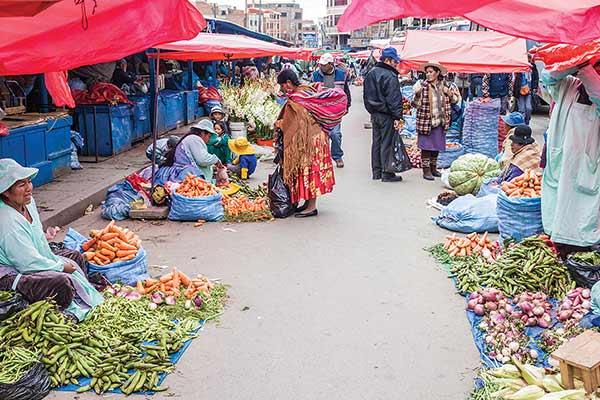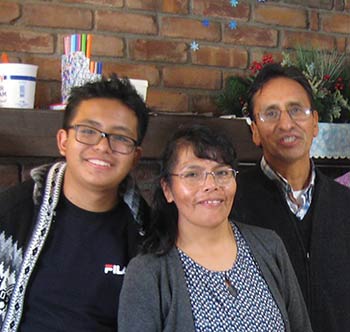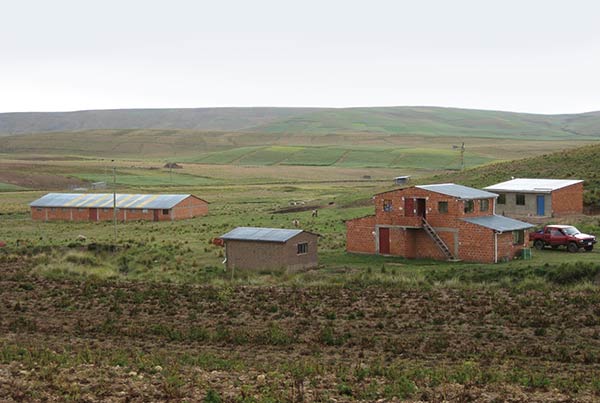Subtotal: $
Checkout-

Two Poems
-

Two Sonnets
-

The Prayers of the Chinese Nature Painters
-

Chaim Potok’s Wandering Jews
-

How to Read Dickens
-

A Communal Publishing House
-

Plough at One Hundred Years
-

Saint Macrina
-

Another Life Is Possible: Four Stories from 100 Years of Life Together
-

Covering the Cover: Solidarity
-

Solidarity in Forgiveness
-

Readers Respond: Issue 25
-

Family and Friends: Francis Schaeffer and L’Abri
-

We Must Not Stand By
-

Deep Solidarity
-

The Church Is Other People
-

Black Lives Matter and the Church
-

Traveling Inside
-

The Solidarity of Grief
-

Dinotopian Visions
-

Solidarity Means Giving Yourself

What does a community inspired by the first church in Jerusalem look like in an indigenous Andean context? Braulio Condori, the founder of such a community in Bolivia, talked to Plough’s Fida Meier about his group’s mission and story.
Already a subscriber? Sign in
Try 3 months of unlimited access. Start your FREE TRIAL today. Cancel anytime.
Plough: Your community, Amigos del Bruderhof, is inspired by (though independent from) the Bruderhof, the community that publishes Plough. With a difference: You’re situated in the indigenous culture of Bolivia’s Altiplano. For twenty years, you’ve been living in full community of goods in the spirit of Acts 2 and 4. How does your Aymara heritage shape the community’s life and mission?
Braulio Condori: We are all people of the Aymara culture. Our mother tongue is Aymara, although we also speak Spanish. Many values in our indigenous culture are also important in the Christian life. Nonviolence, for example, is important in both our culture and our faith, and we hold to it.
We also try to keep our Aymara customs. Here are some examples: Ayni, or mutual aid, is summed up by the saying “Today for you, tomorrow for me.” Minca means I help you, and you give me some of what you earned or harvested during the day. Trueque, or barter, is also important: we exchange potatoes for cheese, or onions for sugar.
We want to be part of our locality, so we invite neighbors to our plantings and harvests, returning the favor later (ayni) or paying them with produce we have on hand (minca). We interact a lot with the people of the village near our Altiplano farm. If there is a meeting, we bring juice or a light meal and share the gospel of Jesus Christ through our testimonies and singing. In La Paz, we mostly meet our neighbors at our market stand. People tell us confidentially about problems they face, and we encourage them with words of hope and forgiveness.

Street market in El Alto, near where the community has its farm. Photograph by Matyas Rehak. Used by permission
It is also important that our community models simplicity and is not perceived as wealthier or living at a higher standard than our neighbors. On the Altiplano, we only installed electricity in 2013, long after everyone around us had it.
How do you make your living?
In the city market, we sell supplies for schools, offices, and universities, as well as children’s toys. We also have a farm on the Altiplano, about twenty kilometers outside the city, where we grow food for our community. We raise milk cows, hens, guinea pigs, and sheep and cultivate potatoes, yucca, broad beans, and other legumes.
What does your community’s outreach look like?
We host retreats, camps, and conferences, especially supporting community-centered organizations and gatherings of indigenous people from throughout South and Central America. Recently, we provided food and lodging for a conference of the Centro de Capacitación Misionera (Center for Missionary Training). People came from Panama, Mexico, Peru, Colombia, Brazil, Argentina, Chile, and Uruguay, as well as other regions of Bolivia. Some of them were very interested in our community and in the early Christians, and wanted further contact. On one occasion, Samuel, one of our members, showed indigenous people from many countries how we cultivate our land with a team of oxen. He demonstrated that communal work is possible even in today’s world.
We also get other churches involved: Lutherans, Nazarenes, Pentecostals, Adventists, and Quakers. They participate materially and spiritually in our conferences. Our goal is to sow the spirit of the first Christians in their hearts and inspire them to strengthen community within their own churches. But most of our communication with others is on a personal level. These friends spread the message to others, who spread it to yet more people.
Several young people from the Bruderhof lived and worked with us for a few months or years between 1995 and 2014. There were also years when we requested that no Bruderhof youth stay with us. We wanted to show that living in community is our own choice, based on Acts 2 and 4, not an imposed foreign model or another North American evangelization effort.
How did your community start?
My father was a pastor in the Evangelical Quaker church in La Paz, Bolivia. As a young man, I supported him, participating enthusiastically as a youth leader. But I wasn’t satisfied, and often wondered how I could live out my Christian discipleship in practical ways, loving my neighbor as myself. I read about the early Christians in the Book of Acts many times. Each time, the question arose in my heart: Was it possible to live like that today?
A fellow Quaker pastor first told me about the Bruderhof. When I learned that there were people living the same faith as the early Christians, it inspired me to start living in community in my own city. A local Mennonite gave me the address of the Darvell Bruderhof in England, and after a few years of correspondence, I invited several Bruderhof members to visit us in Bolivia in 1995. I had always thought that missionaries needed a special place to stay, but in their case there was none of this. They had no problem sharing our food and customs. The simple life of these brothers and sisters rekindled my wish to start a Christian community. They invited us to visit the Bruderhof, so a few months later seven of us adults and a baby visited Darvell.

Braulio, his wife, Maria, and their son, Pablo. Photographs courtesy of Braulio Condori
After a month, we returned to Bolivia, where problems erupted in our church. I was called to a meeting of the national church council where they accused me of following a strange gospel. Then they expelled me from the church. That was my darkest and saddest night. I felt I had lost everything. Later, a letter arrived forbidding me from entering their churches, and this was circulated to each congregation. I tried to visit, but was rejected. Only the small church where I had grown up was willing to take me in.
At this difficult time, we founded our community in a rented house in El Alto, a city on the outskirts of La Paz. Later, we acquired a property in the tropical district of Los Yungas, about five hours’ drive from La Paz, where we shared our faith in Christian community for three years.
In 1999, most of the brothers and sisters decided to return to their former lives. This again was a painful time. At one point, in July 1999, I was the only one willing to make a commitment to full membership, supported by several brothers and sisters who did not want to be full members but would continue doing things with us. Finally another brother, Samuel, who had been a high school senior at the time of the breakup, became a committed member. The joy this brought helped me leave the past behind and look forward. Over the next years, Samuel and I each married and started our families. Our community began to grow again. At present, these two families are committed members, and there are six families of associate members who support our vision of living out the gospel of Jesus Christ in a practical life.
What is your relationship today to your former church, which had expelled you?
One of our most important experiences was when we forgave the leaders who expelled us from their church. Forgiveness is the essence of Christianity. Without it, a person rots inside. So we decided we needed to take the first step, and started visiting ailing family members of these people. At their bedsides, our past disagreements fell away and we reconciled. Today, most of the pastors of that church are our friends. They visit to encourage us on our way of community, and we converse like brothers and sisters. We give them books, and they donate money to help out.
We have also made every effort to heal broken relationships with former members who left our community. Forgiveness starts right away, but sometimes takes time to come to fruition. They have slowly drawn closer, and now we are good friends. Our forgiveness and love must be expressed continually. We can’t say “it’s all good” with words unless we follow up with deeds. So we call them and sometimes they tell us about their problems. If we can help, we do, even if we can’t give much. We invite them to our conferences, where they participate with enthusiasm.
At the end of 2019, there were protests sparked by the presidential election results and the subsequent ouster of Evo Morales, who had been Bolivia’s first indigenous president. How did this turmoil affect your community?

The community’s farm on the Altiplano
This is not the first time we have lived through unrest. El Alto is a city full of internal refugees, and uprisings are common. Over the years, the abuses of various administrations have sparked resistance movements, which we were involved with, even participating in some protests.
Morales did much for the poor and indigenous, but we didn’t always agree with him. In 2017, he changed Article 88 of the penal code, which addresses human trafficking, establishing a seven- to twelve-year prison sentence for recruiting people for armed conflicts or religious organizations. We feared that preaching the gospel would be prohibited. If I would invite seekers to my house to share the gospel with them, would this be illegal? As a community, we listen to the voice of God and obey him before these laws, even if that means risking our lives. If we love Jesus, he will guide us in the best way and protect us. And he has continued to do this. After six weeks of popular protest, the new law was overturned.
But you asked about the recent upheaval, when Morales was forced to leave the country. Factions erected roadblocks. People were so desperate for food that there was looting in the markets. Sellers fled with their goods so they wouldn’t lose the little capital they had. Because we are part of a union in the market, we support the other vendors. There we were together, and we had the opportunity to call for God’s protection with prayers and Bible readings. Right there in the market, everyone went down on their knees to ask for protection and peace for our country.
On our farm, Samuel and his wife, Margara, had a similar experience. Our neighbors considered our community a trustworthy place and brought their belongings for safekeeping. Through this, they drew close to us and we could proclaim the gospel by showing them love. Every time we met as a community, we knelt to pray for peace for Bolivia. Getting involved doesn’t mean being contaminated by politics. It means spreading the love of Christ in the midst of desperation. It means offering the hope that Jesus is present in every situation.
What is your vision for the future of your community?
Our plans, hopes, and vision are in God’s hands. We don’t want to write things down on paper. We just want to be attentive to the voice of God and be guided by the spontaneous Spirit. Our vision is to be a community that cannot be hidden, like the city on a hill in Matthew 5:14.
Interview by Fida Meier on January 15, 2020. Translated from Spanish by Coretta Thomson.
Already a subscriber? Sign in
Try 3 months of unlimited access. Start your FREE TRIAL today. Cancel anytime.
































Leona Wieland
Thank you for writing, sharing your story of trying to live Gospel, Jesus centered lives. We try to do the same here, like yesterday standing on the street to protest those detained in the local jail. Two judges declared him innocent, but no, Marco has been detained for more than a year in jail.